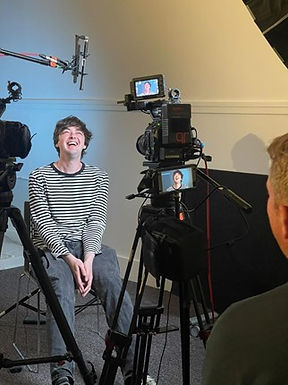GlasgowGPT: A very scottish answer to ChatGPT
Nan Zhang

David Hewiston, starter of GlasgowGPT
Image Credit: Jim Lang
What is GlasgowGPT? According to its own introduction, it is "a wee chatbot fae Govanhill". For its creator, 29-year-old self-taught coder and playwright David Hewitson, it was just a joke that he created to "antagonise" his flatmate by talking like a Glaswegian.
The chatbot talks with "Glesga" slang, some swearwords, and an ironic tone- which can make it aggressive or amusing.
If you are feeling a bit sensitive, then you may need to take care when talking to it - but maybe you want to compete to see who's more cynical? If you are broadminded, it will probably make you laugh. Part of comedy’s role is after all to offend some people. The chatbot provides an excellent insight into the Glaswegian sense of humour.
With such a distinctive approach, GlasgowGPT "suddenly exploded in popularity" and "became like an overnight local hit" in in July last year, David told Blether Magazine. So much so that the number of website users reached hundreds per day at its peak, including users from all over the world.
The first Scottish chatbot “made AI feel real to a lot of people in a way because it was suddenly so specific to our culture rather than just American culture.”
David has received messages of thanks, including from someone in Scotland who uses it as a shared hobby for the family as well as someone in South Asia who finds that it helps him to reminisce about the years he lived in Glasgow.
Such comments make David feel that his work is worthwhile and gives him a sense of pride. The project took only a week from the idea's inception to its debut, but thereafter it took months of refinement.
Initially he used the software known as the GPT3.5 API (Application Programming Interface) which is available from OpenAI. Then he writes lot of descriptive languages, known professionally as "prompts", to build personality and rules for the chatbot.
David adds, "anyone could do it."
Recently OpenAI has launched its GPT Store. Now paid ChatGPT users can design their own chatbots with different personalities based on the company’s language models.

Image Credit: by Matheus Bertellli on Pexel
Unsurprisingly, this impressive chatbot has brought David various job opportunities and a few investors who want to commercialise GlasgowGPT or create an AI company. David, who comes across as a sensitive, sociable young man says, however, “I don't think I would ever be comfortable enough to make a living out of it.”
He added, “I love technology and I love experimenting. But I don't feel the technology can exist independent of ethics”.
David is aware that a Belgian chatbot told someone to end his own life and he sadly did so afterwards. “It was on my mind like what if this goes wrong and it says something dangerous or it does something unhinged.”
OpenAI itself has admitted that ChatGPT can produce “politically biased, offensive, or otherwise objectionable” answers.
This is precisely the most worrying potential danger of generative artificial intelligence (AI). In the same way that a writer can lose control over a character in their story, a chatbot is not entirely in control of what is said in dialogues.
David has further concerns about other possible influences on people: “Some people tend to treat it like a therapist, sometimes they confess their secrets to the chatbot. Some people even fall in love with the chatbot.”

Image Credit: Martyn Robertson
At the end of last year, he decided to move on to his theatre work, “I just reached a point of I want to focus on creating exciting new things. And you’re in a shared space and it's just much more physical and much more real.”
Like many young people in Scotland, David is worried about unemployment resulting from AI. Unlike most people, however, he has had some very unusual experiences with AI.
He has been interviewed by BBC Radio, talked to lawyers about copyright, and has even been publicly criticised on social media. Reflecting on the whole experience, David says, “Weirdly enough, it was kind of the intersection between my life in computing and my life in theatre.”
Now he regards GlasgowGPT as a fun and creative project -leaving it largely to look after itself. There is a “donate” button, but only for covering the cost of running the website. In David’s words: “It’s not for profit, it’s just a joke”.




